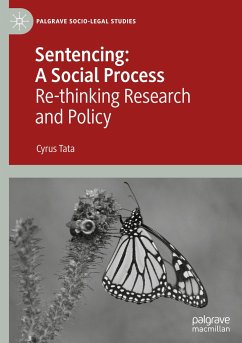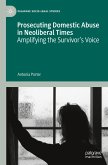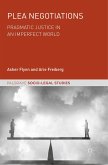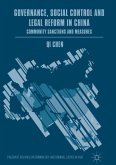This book asks how we should make sense of sentencing when, despite huge efforts world-wide to analyse, critique and reform it, it remains an enigma.Sentencing: A Social Process reveals how both research and policy-thinking about sentencing are confined by a paradigm that presumes autonomous individualism, projecting an artificial image of sentencing practices and policy potential. By conceiving of sentencing instead as a social process, the book advances new policy and research agendas. Sentencing: A Social Process proposes innovative solutions to classic conundrums, including: rules versus discretion; aggravating versus mitigating factors; individualisation versus consistency; punishment versus rehabilitation; efficient technologies versus the quality of justice; and ways of reducing imprisonment.
"Sentencing: A Social Process Re-thinking Research and Policy, offers a convincing critique of contemporary sentencing research and policy literatures. Eloquently and eruditely written ... . Tata's (2020) book makes an impressive contribution to the current state of literature in sentencing research and policy is a must-read for anyone interested in sentencing decision-making." (Niamh Maguire, Probation Journal, Vol. 68 (2), June, 2021)
"Tata's book is persuasively and beautifully written. It is clear and well structured, and both informative and challenging. It is an inspiring piece of work, and ought to be read and enjoyed both by academics and by reflective sentencing professionals from the legal and therapeutic professions." (Ester Blay, Journal of Law and Society. Vol. 48 (1), March, 2021)
"An invitation to rethink existing orthodoxies and to broaden the scope of academic writing and thinking about the nature of sentencing. ... it is eminently approachable,and deservesto be widely read." (David Hayes, Punishment & Society, August 26, 2020)
"Every once in a while, a work appears that mounts a robust challenge to some of our most fundamental assumptions about sentencing. Cyrus Tata's new book, Sentencing: A Social Process. Re-thinking Research and Policy ... is one such work." (Tom O'Malley, sentencingcrimeandjustice.wordpress.com, July 26, 2020)
"Tata, in this eminently readable book, notes the limitations of current academic discourse around sentencing. ... serves a functional role in maintaining the mystique of sentencing." (Maggie Hall, International Journal for Crime, Justice and Social Democracy, Vol. 9 (3), 2020)
"A lively and compellingly original scholarly foray into sentencing research ... ." (Mike Guilfoyle, crimeandjustice.org.uk, March 1, 2020)
"Tata's book is persuasively and beautifully written. It is clear and well structured, and both informative and challenging. It is an inspiring piece of work, and ought to be read and enjoyed both by academics and by reflective sentencing professionals from the legal and therapeutic professions." (Ester Blay, Journal of Law and Society. Vol. 48 (1), March, 2021)
"An invitation to rethink existing orthodoxies and to broaden the scope of academic writing and thinking about the nature of sentencing. ... it is eminently approachable,and deservesto be widely read." (David Hayes, Punishment & Society, August 26, 2020)
"Every once in a while, a work appears that mounts a robust challenge to some of our most fundamental assumptions about sentencing. Cyrus Tata's new book, Sentencing: A Social Process. Re-thinking Research and Policy ... is one such work." (Tom O'Malley, sentencingcrimeandjustice.wordpress.com, July 26, 2020)
"Tata, in this eminently readable book, notes the limitations of current academic discourse around sentencing. ... serves a functional role in maintaining the mystique of sentencing." (Maggie Hall, International Journal for Crime, Justice and Social Democracy, Vol. 9 (3), 2020)
"A lively and compellingly original scholarly foray into sentencing research ... ." (Mike Guilfoyle, crimeandjustice.org.uk, March 1, 2020)








